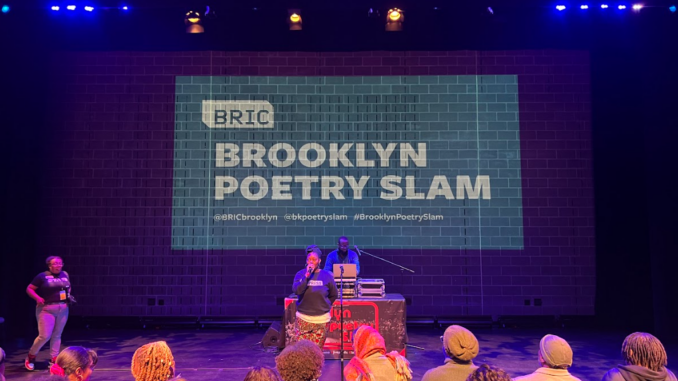
By Jaida Dent
Tuesday, March 26 was marked with powerful words shared throughout the night as BRIC Arts Media hosted their annual “Brooklyn Poetry Slam.” The event saw those of all ages in the audience, gathering to hear the words of local poets who came to compete. It was hosted by its founders Mahogany L. Browne, Lincoln Center’s first ever poet-in-residence, and Jive Poetic, a poet, educator, and DJ.
Poetry slams are a form of competition between poets, but it is ultimately a showcase of material. Losing isn’t seen as failure, but rather motivation to continue performing. This slam held importance to its founders because it is the ten-year anniversary of the Brooklyn Poetry Slam. This slam also comes right before National Poetry Month, which has been recognized every April since 1996. To the founders, the night is not just about “selling” poetry: it’s about bringing poetry fans together.
“The reality is there are very few spaces where poetry is just for the people. There are no attempts to sell merch, or drinks, or coffee. We’re not squeezing people into a space and just telling them to be happy with it. This is truly poetry for the people, a large stage, a beautiful production, and it’s free,” Browne told The Vanguard.
The event consisted of an open mic with featured poet Ibi Zoboi, a New York Times Bestselling Author. Afterward the slam began.
The slam consisted of seven poets who ended up being chosen by a lottery, primarily due to the amount of people who signed up to compete. To continuously promote community at the event, the judges were members of the crowd who were chosen at random by Browne. Each judge was given a score card they used to score each poem on a scale of one to ten. The final score was calculated by dropping the lowest and highest scores and then dividing the total by three, where the maximum score for a poet was 30. Based on the scores, the three poets with the best scores proceeded to round two, where the slam champion is determined.
The winner of the slam and the only woman in the competition, Jerica Deck “Jeri Rae,” won the slam by obtaining a perfect score of 30.
“I feel like the audience validated a lot of my feelings. I don’t always put myself in my pieces like that, I kind of struggle with the vulnerability. I feel like my first piece is really the first piece that’s really like, ‘Oh this is me’ and to feel the love and the reception of both pieces, it means a lot, regardless of the score,” Rae said.
Her pieces were centered around her personal struggles in relationships. Her second round poem described how “Mac and Cheese” is a better side dish, and the metaphor alluded to how individuals might always return to the “side chicks” rather than the “mains,” or those who they are meant to be in a committed relationship with. Not only does poetry serve as a space for expression, but also personal growth. The night served as an opportunity for Rae to not only grow her confidence, but her performance skills as well as she will advance to the Brooklyn Poetry Slam’s finals in June.
“I’ve always been a very shy kid, and poetry kind of allowed me to be a better speaker and meet more people. So I think it just helped me to express myself especially like, again with the vulnerability and the darker points of myself,” Rae said.
BRIC is no stranger to hosting events focused on the arts, as they have produced Emmy-Award winning content on their channel, BRIC TV. They also host many affordable workshops specializing in film, podcasting, and social media. These classes are designed to equip Brooklyn residents with the tools to become producers in their own right.
“I think about poetry as a voice, and like most people, we forget that we have purpose, especially when we are upset, or feeling silenced, or forgotten. And poetry is the equalizer. It allows everyone to have a voice. It allows spaces to be permeated through sounds, texts, and language,” Browne told The Vanguard.
While slams are competitive in nature, it is not winning that drives people, it is simply being heard and having a chance to share ideas. The night hosted a display of the affinity that people have towards poetry and the connection it creates between the audience and the poets.
“If we don’t write our stories, who will? So, poetry is that nucleus of self-preservation, self-storytelling, and narratives that exceed our expectations,” Browne said.
For more information about BRIC and the Brooklyn Poetry Slam, follow them on Instagram: @bricbrooklyn and @bkpoetryslam.
